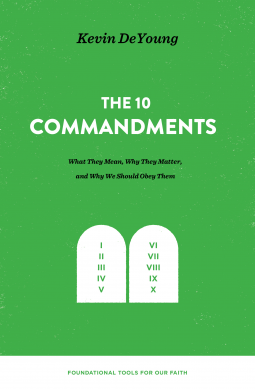
The Ten Commandments
What They Mean, Why They Matter, and Why We Should Obey Them
by
This title was previously available on NetGalley and is now archived.
Send NetGalley books directly to your Kindle or Kindle app
1
To read on a Kindle or Kindle app, please add kindle@netgalley.com as an approved email address to receive files in your Amazon account. Click here for step-by-step instructions.
2
Also find your Kindle email address within your Amazon account, and enter it here.
Pub Date Oct 31 2018 | Archive Date Oct 05 2018
Talking about this book? Use #TheTenCommandments #NetGalley. More hashtag tips!
Description
Pastor and best-selling author Kevin DeYoung delivers critical truth about the Ten Commandments as he explains what they are, why we should know them, and how we should apply them today.
Pastor and best-selling author Kevin DeYoung delivers critical truth about the Ten Commandments as he explains what they are, why we should know them, and how we should apply them today.
A Note From the Publisher
PDF may not be compatible with all reading devices
Advance Praise
“Seasoned by personal wit, shaped by years of pastoral ministry, and highly skilled in interpreting God’s Word, Kevin DeYoung is the right person to write this book. DeYoung fleshes out the Ten Commandments in a way that helps us see the wisdom of our Creator and Redeemer in directing us on our pilgrim way. I highly recommend this book!”
—Michael Horton, J. Gresham Machen Professor of Systematic Theology and Apologetics, Westminster Seminary California; Host, White Horse Inn; author, Core Christianity
Available Editions
| EDITION | Other Format |
| ISBN | 9781433559679 |
| PRICE | $17.99 (USD) |
Featured Reviews
 Trevor K, Reviewer
Trevor K, Reviewer
I am thankful to Crossway and net galley.com for an advance copy of this book. We live in the days of antinomianism in the church (largely) days when due to the rediscovery of justification through faith alone people have little time for the law of God.
This short book is a helpful reminder to us of how as Christians we must love the law of God. In this book DeYoung seeks to remind us of the benefits of the 10 commandments. The structure is fairly simple with an introduction and then working through each of the 10 commandments themselves. As with everything that DeYoung writes the book is very easy to read, littered with helpful illustrations and will be of tremendous benefit to anyone who reads it.
“The Ten Commandments: What They Mean, Why They Matter, and Why We Should Obey Them” offers exactly what its title says. Author DeYoung convicts you, shows you why each of the commandments should be obeyed and how to be obedient to the commands God has given us. Kevin DeYoung has caused me to be deeply convicted of my sin while giving me a greater understanding of the “Why” and “How” to follow the commands given to Moses at Sinai. It is important to keep in mind the knowledge that we are not earning our salvation, nor does Kevin DeYoung think we are, by obeying the ten commandments as he makes clear from the very beginning of his book. In the introduction, DeYoung brings a startling reality of both the world and the church to our attention. Most of us understand the ten commandments to be foundational, or at the least very significant to the Christian faith. But how many of us can recite them? We may be embarrassed in the church today if we, at random, were to pick a Christian and ask them to name each of the commandments.
Of course, there may be those who can proudly proclaim their memorization of the Ten Words, Decalogue, or however one may prefer to refer to them. This book is certainly for them as well. Many of us in the church today very unfortunately think we have moved past the ten commandments. “Don’t kill people, got it, not a problem,” we think to ourselves and “move on” to what we may find more interesting or relevant. As the reader will quickly come to realize, there are so many ways we break the ten commandments every day. It is more than simply saying “OMG” as DeYoung will explain in his chapter on the third commandment.
The commandments are more than just a list of “Dos and don’ts”, they reveal God to us. God does not want us to worship the wrong god nor does He want us worshiping the right God in the wrong way, as the first two commandments inform us. Each chapter following is ever-relevant and convicting. A person may think to themselves that they have the ten commandments down, that they follow them flawlessly. I would be surprised and perhaps somewhat concerned if that person could maintain that position after reading through this book. Even the commandments we think we so clearly don’t deal with “I’ve never STOLEN anything, I don’t covet”, DeYoung may change your mind about before you finish reading. His book is not legalistic but it will definitely show you your heart.
I thought Kevin DeYoung dug into each of the Ten Commandments in a way that exposes sin and leaves you even more grateful for the Gospel. I appreciated the first few chapters that explained why the commandments are still important today. I’d definitely recommend this book.
 H. C. N, Reviewer
H. C. N, Reviewer
This originally appeared at The Irresponsible Reader.
---
My initial thought when I saw this book was: do we need another popular-level work on The Ten Commandments? We've got so many already, like: Ryken's Written in Stone, Horton's The Law of Perfect Freedom, Packer's Growing in Christ. We've got Douma's, Watson's and Durham's (newly republished) on the heavier end of the spectrum, too. Why bring out a new book by DeYoung? Still, I was intrigued, so I requested a copy.
Not too surprisingly, I'm glad I did. This is typical DeYoung: a strong, affectionate, orthodox take on the Law delivered in a very accessible and affable manner. He made me think, he made me reconsider a thing or two, and he reminded me of a few things I needed reminding of.
He begins this work against the framework of the secular "anything goes" point of view, where everything certainly does not go -- as much as we as a culture might rail against an external source of morality -- there are things that simply cannot be said or done. Giving us a choice between humanity's unwritten, assumed code -- or God's revealed will. DeYoung then goes on to list reasons for the study as well as the following of God's Law.
The other important groundwork comes from the midst of his very strong chapter on the First Commandment in which he describes the role of the Law for New Covenant believers. It's still applicable, still binding -- just in a different manner. I think this could've been developed more -- maybe in its own chapter, but what we got here was good. I do particularly appreciate his metaphor of transposition. The Law in the New Covenant is the same for believers as it was in the Old, it's just in a different key.
Following the introduction where he lays out his framework, DeYoung turns to consider the commandments individually. This is the bulk of -- and the heart of -- the book, with a chapter devoted to each commandment. If the book has any value, it'll be found here, and there's a lot of it to be found. I briefly considered summarizing each chapter, but why steal his thunder. Also, he's not carving out anything new here, so there's little need. What's new is his expression of the timeless truths, his way of explaining and applying them. If you want a quick summary of what he'll say about each commandment read The Heidelberg Catechism questions 92-115 or the Westminster Shorter Catechism questions 39-85, and you'll get a pretty good idea.
Instead, I'll just comment on a few highlights and a couple of problems I had (your mileage may vary). I found his comments regarding the Fourth Commandment to be helpful, but hesitant -- in his effort to not be legalistic, or overly dogmatic, he comes across as wishy-washy. I appreciated most of what he had to say about the Second Commandment, but again, he's hesitant enough in some of his application to stumble a bit. Which is not to say that the bulk of those chapters weren't good and helpful -- they were. I think he could've been more consistently so.
Conversely, the chapters on the Eighth and Tenth commandments were incredibly helpful. If you ask me, these two are where the American Church and American Christians stumble more often than we realize (or care about). Publicly, Protestants are expounding so much energy on certain applications of the Sixth and Seventh commandments that one would be tempted to think that 8-10 are concerns of the past. DeYoung doesn't let the reader think that for an instant, and if you don't come away from these chapters with a good dose of conviction of your own sin, you probably didn't read it too closely.
The chapter on the Third Commandment was invaluable also. It's far too easy for Western Christians to reduce this to "don't be a potty mouth" and far too hard for us to really get what the importance of "name of the Lord" is. DeYoung does a yeoman's job on both fronts and does a good job expounding the meaning of this commandment.
You'll never walk away from any of these chapters thinking that DeYoung is writing a hellfire and brimstone jeremiad against the Church, you, or anyone. He's sharply critical of a lot of general culture, and individual inclinations, but that's to be expected. There's conviction and inspiration both to be found in these pages -- all delivered in DeYoung's warm, almost conversational, style -- a strong blend of wit and charm with the steel in his words. I won't get into it, but his chapter on the Third Commandment contains one of the funniest anecdotes (more in the telling than the story) I've read from him. Ignoring his content for a moment, his writing style is what will keep me coming back to DeYoung's books for years to come.
I think I've said before, I'm not a big one for study/discussion questions in books -- I like to think the engaged reader doesn't need them and someone leading a discussion/study of a book will be clever enough to come up with their own. But, I'm obviously swimming against the tide on this because publishers keep printing them. That said, on the whole, this is a pretty good set of questions and would help someone who likes those kind of questions for their own use or for those using the book in Family Worship, Sunday School, or Bible Study.
In the end, my question, do we need another popular-level book on The Ten Commandments? Is answered yes: we need frequent -- constant -- reminders of the revealed will we've been called to obey, so we never stop striving for that perfection and never cease calling on the Spirit's assistance. We also need to remember how great our sin and misery are so that we constantly live lives of repentance. So bring on DeYoung's good summary. And others as well -- and we need to read them, as well as the older popular-level works. And then we need to push ourselves and read some of the less-popular level ones as well.
This is a good, short set of meditations and reflections on the perfect law, the law of liberty for a contemporary audience. It's approachable, it's warm, it's pointed, and it's Gospel-centered. It's not perfect, but it's good. It functions well as a refresher for those who need one, and a good starting point for their own study of The Ten Commandments. I'm buying a copy (at least one) for my personal library and will be encouraging my household to read it -- and anyone else who asks.
Disclaimer: I received this eARC from Crossway via NetGalley in exchange for this post -- thanks to both for this.
Readers who liked this book also liked:
Patti Callahan Henry
General Fiction (Adult), Historical Fiction, Women's Fiction












